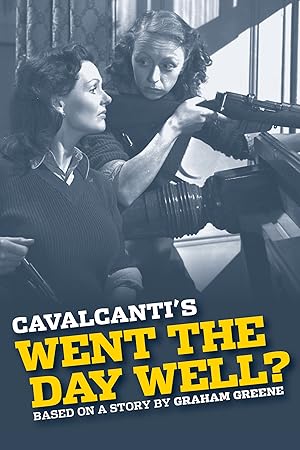
Went the Day Well? Page #3
so you can speak quite freely.
Good, my orders are to give you
all the necessary information.
- How much do you know already?
- Practically nothing. Do sit down, will you?
Berlin has a maddening habit
of making us work in the dark.
Airborne and seaborne invasion in force
is to be launched on Monday night.
- Monday night?
- No, thanks.
- The day after tomorrow?
- Yes.
Our task is to jam radio-location.
With the apparatus we've got, we can put
the British locators out of action.
My unit deals with the central area.
Radius, 300 miles.
But this apparatus
must be extraordinarily complicated,
if it needs all those men to assemble it.
Not to assemble, but to protect it.
If we are found out, we shall be attacked,
and my orders are to hold this village,
and to continue to hold it
for 48 hours after invasion starts.
Uh-huh. Oh,
so that's why you want to contact my O.C?
Exactly. It's always useful to know
one's enemy's plans in advance.
Hello?
- Hello?
- Telegram for you.
- Hold on a second, Violet, while I get a pencil.
- Okay.
I had that pencil of mine a minute ago,
everything seems to be losing itself
this morning.
Daisy, see if you can find those keys
for me, will you? There's a good girl.
What keys was it you was wanting, sir?
- The hall. The village hall.
- Well, they're usually kept...
- Yes, she's already looked there.
- Oh.
That couldn't be them, could it,
hanging up by those ladies'?
Why, so it is.
Found them? That's right.
Sergeant, I'd better come with you,
the lock's a bit tricky.
Daisy, find an envelope for that
and pop up with it to the manor house.
But we've run out of envelopes.
You told me to remind you.
Oh, never mind, they tell us to save paper.
But, wait a minute,
we can't both of us be out at once,
I'll take it, it's only a step further.
- Sorry to have kept you waiting.
- I hope you won't be long.
- No, why?
- You've got the telephone.
Oh, so I have.
- Royal Engineers.
- You ought not to tell.
Oh, the cards, I mustn't take them away.
You boys'll be glad of a game.
Oh! The great, big...
You great, bullying brute, you.
Knocking a child about,
you're a disgrace to your uniform.
Why, you're no better than a German,
that's what you are.
Did you see what this man did?
You report him to your officers at once.
- He was tampering with equipment.
- Well, what if he was?
There's no call for a
great, hulking brute...
All right, all right, you'll be on charge
for this. Orders tomorrow morning.
And so I should think.
And let it be a lesson to you, young man,
not to go nosy-parkering.
Translation
Translate and read this script in other languages:
Select another language:
- - Select -
- 简体中文 (Chinese - Simplified)
- 繁體中文 (Chinese - Traditional)
- Español (Spanish)
- Esperanto (Esperanto)
- 日本語 (Japanese)
- Português (Portuguese)
- Deutsch (German)
- العربية (Arabic)
- Français (French)
- Русский (Russian)
- ಕನ್ನಡ (Kannada)
- 한국어 (Korean)
- עברית (Hebrew)
- Gaeilge (Irish)
- Українська (Ukrainian)
- اردو (Urdu)
- Magyar (Hungarian)
- मानक हिन्दी (Hindi)
- Indonesia (Indonesian)
- Italiano (Italian)
- தமிழ் (Tamil)
- Türkçe (Turkish)
- తెలుగు (Telugu)
- ภาษาไทย (Thai)
- Tiếng Việt (Vietnamese)
- Čeština (Czech)
- Polski (Polish)
- Bahasa Indonesia (Indonesian)
- Românește (Romanian)
- Nederlands (Dutch)
- Ελληνικά (Greek)
- Latinum (Latin)
- Svenska (Swedish)
- Dansk (Danish)
- Suomi (Finnish)
- فارسی (Persian)
- ייִדיש (Yiddish)
- հայերեն (Armenian)
- Norsk (Norwegian)
- English (English)
Citation
Use the citation below to add this screenplay to your bibliography:
Style:MLAChicagoAPA
"Went the Day Well?" Scripts.com. STANDS4 LLC, 2024. Web. 27 Apr. 2024. <https://www.scripts.com/script/went_the_day_well_23229>.


Discuss this script with the community:
Report Comment
We're doing our best to make sure our content is useful, accurate and safe.
If by any chance you spot an inappropriate comment while navigating through our website please use this form to let us know, and we'll take care of it shortly.
Attachment
You need to be logged in to favorite.
Log In